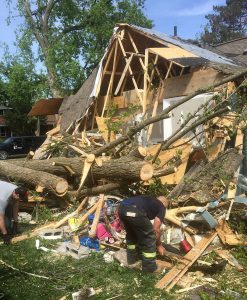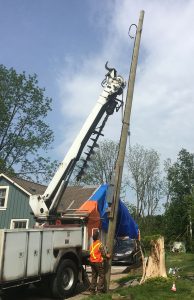
It’s funny what the eye never sees or what’s in plain sight, but not noticed. A week or so into the aftermath of the derecho – that’s now part of our weather history – I attempted some clean-up around our yard. A piece of chrome in the grass caught my eye. When I brushed off the dirt and shingle debris it’d been hidden under, I realized it was a tightly coiled spring. It was so clean and shiny, it could’ve come right out of a hardware store bin. Then (as I’ve found myself doing a lot the last couple of weeks) I put the spring in my pocket and asked myself:
“Where did that come from?”
I don’t think I’m alone when I suggest Uxbridge residents have experienced scenes like those we’ve watched for years on CNN of Americans in tornado alley sifting through the debris of their decimated homes after the twister went through. They were trying to salvage something of what was, a morsel of the normalcy from just hours before.

In contrast, we’ve been fortunate that for whatever reason – the amber alert, circumstance or coincidence – no one in our community was killed, injuries proved non-life-threatening, and damage was limited primarily to trees and property. As I’ve suggested to many who passed by our house with offers of help and words of condolence: “It’s all stuff. It can be replaced.”
However, the one thing I haven’t said to well-wishers and friends these past two weeks is that I think the storm has left a catalogue of impressions – some positive and some negative – that will never fade. And if you’ll allow (in case they resonate) I thought I’d offer a random selection.
First, have you noticed how welcome the chirp of songbirds and the rustle of breezes through surviving tree foliage sound? I thought I’d never hear the end of grunting chainsaws and revving diesel engines up and down our streets. Mind you, I do not fault any of the safety inspection crews, hydro linemen, communications repair staff or township clean-up crews. I’m sure they’ll be well paid (and should be) for their long shifts and time away from families at night and on stat holidays; some have come from as far away as New York State and Quebec to help.
We got power back at our house on June 2, and let me tell you that first hot shower was heavenly. Funny the things we take for granted…
Including friends. We may not have had hot water in our house, but we’ve been showered with countless offers of help. Most of my oldtimers hockey teammates have gone out of their way to assist – one offered a vacant house for us to borrow; another the labour to seal off the end of our house exposed to the elements; several knew we’d lost a car and offered grocery pickup; and one has loaned me a car.

One afternoon, as two workers (I sensed were immigrants from Russia) installed a temporary hydro pole next to our damaged house, a neighbour dashed up, gave me a sympathetic hug and said the door to her house was open to anything we might need.
“That was very impressive,” said Dimitri, one of the pole installers. “That would never happen where I live.”
Have you noticed how talkative we all are since the storm? When I emerged from the house basement – within minutes of the tornado passing – all of our neighbours had come outside too. First and foremost each asked the other, “Are you OK?” Then, we all compared notes about this sound or that vision. Everybody had cell phones out for video on stills as if to say, “Hey, we made it. We’re still here.”
It’s more than two weeks and we’re still learning what the storm did. I have a couple of startling photos: one shows an asphalt shingle driven – at 90 degrees – into our front-yard spruce tree; another my daughter took of a two-by-four from our neighbour’s fence impaling my backyard aluminum shed.
Somebody asked me the other day how I was dealing all this upheaval. I think I said, “At least I don’t have bombs falling on my head, like in Ukraine.” But then I added that after many days of dealing with dead trees and broken possessions, one afternoon last weekend I abandoned the salvage operation and changed my focus. Instead of picking up pieces of debris – and wondering where this piece or that one had come from in the garden – I finished a raised bed that I’d started back in mid-May. Then, I planted some potatoes.
Somehow the notion of nurturing some new life seemed the best antidote to coping with what we’ve lost.